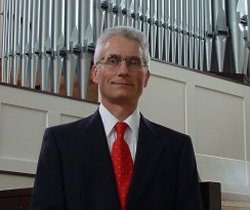
| | Organist | Accordionist | Composer | Conductor | Author | Educator |

 |
Henry Doktorski
|
 |
March 2001: Henry Doktorski performed at the City University of New York on Friday, March 23rd, 2001. The recital, sponsored by The Center for the Study of Free-Reed Instruments and The John D. Calandra Italian American Institute, began at 7:30 P.M. at the Baisley Powell Elebash Recital Hall at The Graduate Center, CUNY, 365 Fifth Avenue at 34th Street (right across the street from the Empire State Building).
Doktorski performed compositions by two great Italian-American accordionists of the first half of the 20th century: Guido Deiro and Pietro Frosini.
Guido Deiro was born in Salta, Italy in 1886 and began his music career by playing at beer gardens and cafes in Italy and Germany. After he emigrated to the United States shortly after the turn of the century, he became famous as a vaudeville star, international recording artist, composer and teacher. At $600 per week, he was the highest paid musician on the vaudeville circuit. Deiro married the famous actress Mae West. When the cinema industry added soundtracks to movies in 1932 and caused the vaudeville shows to go out of business, he turned to teaching accordion students. He died in 1950.
1999 PhotoPietro Frosini was born in Catania, Sicily, in 1885 and began to play the accordion at the age of six. He studied piano, cornet, harmony, counterpoint and composition at the Municipal Conservatory of Fine Arts in Catani Sicily and the Milan Conservatory of Music, as the accordion was not recognized as a "legitimate" instrument. At the age of fourteen, he played first cornet with the British Navy Band at Malta.
In 1905 Frosini brought his accordion with him to San Francisco and was discovered by a talent scout for the Orpheum Vaudeville Circuit. Soon after, he met and became friends with Guido Deiro. Frosini made one of the first accordion recordings on a cylinder record for Edison in 1907 and made his first Victor recording in 1908. He traveled extensively on the vaudeville circuit in America and abroad and even performed for the King of England.
Frosini gave up vaudeville in 1932 (as did Deiro) when the "talkies" closed most vaudeville companies; he then became a staff accordionist for WOR radio in New York, a position he held until his death in 1951. Throughout his career, he performed, taught, composed and arranged music for the accordion. He wrote more than 200 original compositions for the instrument.
During the CUNY recital, Doktorski performed two works by Guido Deiro: the waltz My Florence (1916) and the fantasia Egypto (1952), and four pieces by Frosini: the swing novelty Rag in D Minor (1918), the overture Omaggio a Pietro (1918), the waltz Florette (1934), and Rhapsody No. 2 in C Minor (1939).
The recital was part of a larger event sponsored by CSFRI titled The Accordion as an Icon of Italian American Culture. This two-part event began on March 23rd with a symposium at 3 P.M. (in which three scholars presented papers examining aspects of the accordion and Italian American culture), and concluded with the accordion recital at 7:30 P.M. The recital was videotaped by ITALICS: The Italian American Magazine for broadcast on cable television. Other performers included Robert Y. McMahan and William Schimmel.
Guido Deiro's son, the distinguished Count Guido Roberto Deiro, attended the event and congratulated Doktorski at the post-concert reception. Earlier that day, Count Deiro had donated his father's memorabilia, which included Guido Deiro's own accordion, his 78 RPM recordings and various news clippings, to The Center for the Study of Free-Reed Instruments at CUNY Graduate Center for research and safekeeping.
To read appreciations by audience members, go to Letters.
The symposium and concert was videotaped by CUNY-TV for broadcast on channel 75 during October 2001 (Italian Heritage and Culture Month).
|
see Contact Henry Doktorski. |
| Back
to The Homepage of Henry Doktorski |